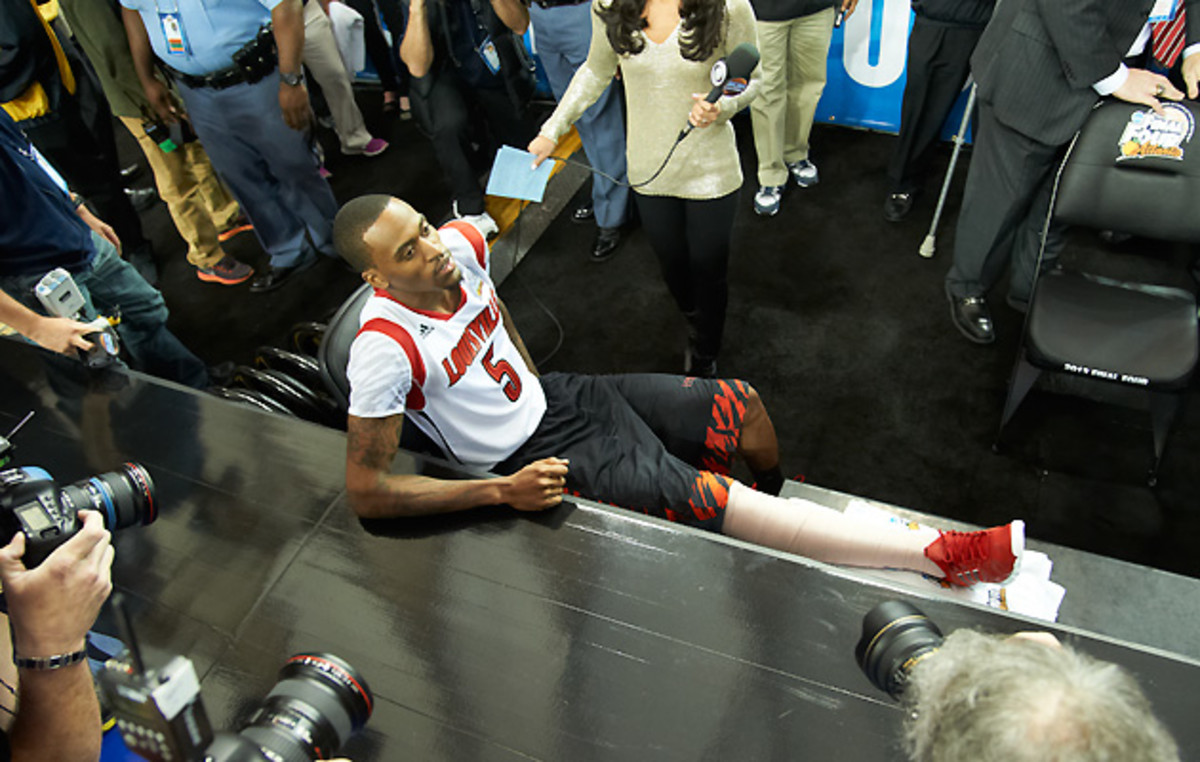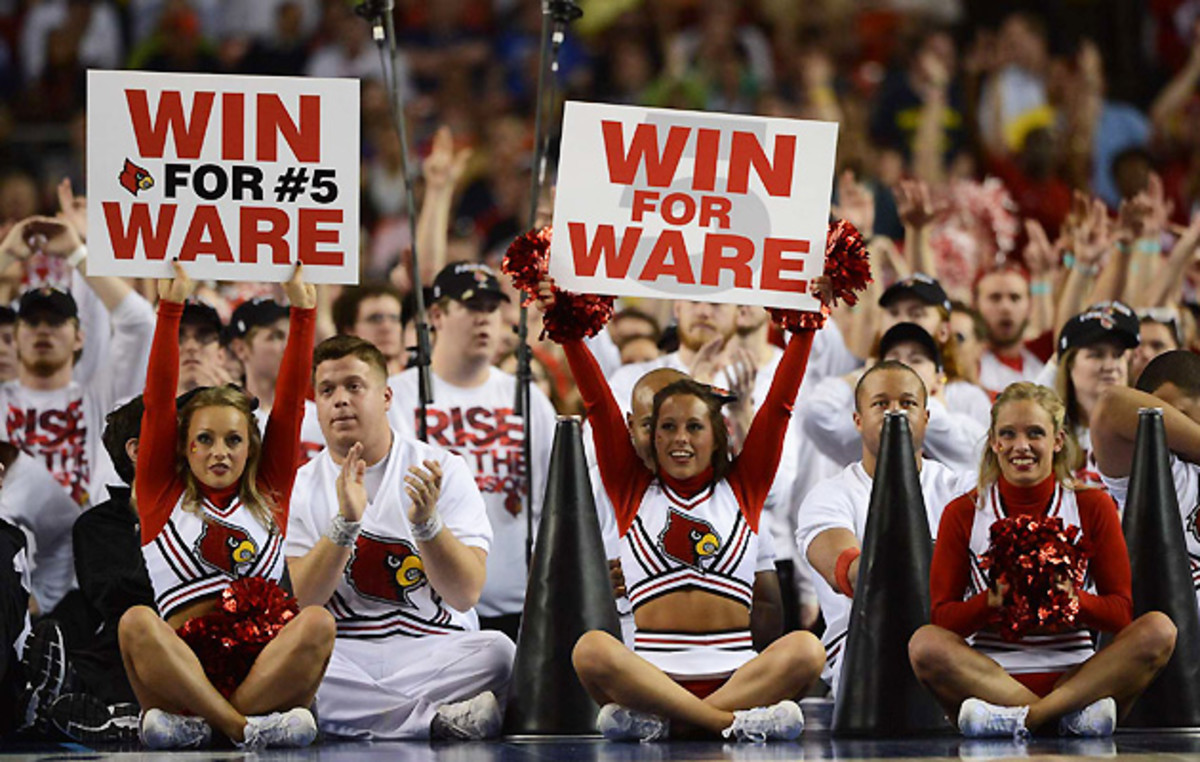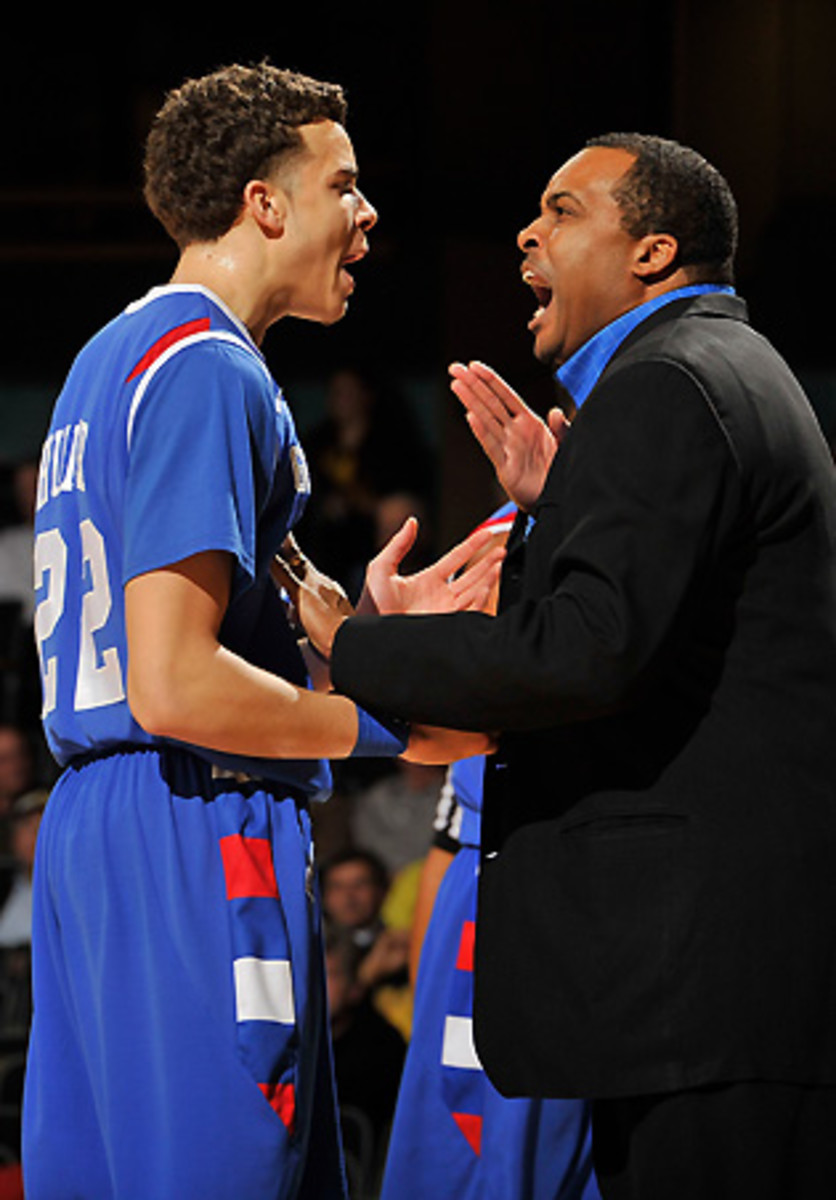Unbroken: Kevin Ware rebuilding his hoops career away from the spotlight

ATLANTA -- The arena goes dark, except for the waving spotlights, and the announcer calls out five names. Shipes. Crider. Green. Hunter. Harrow. Tonight’s starting lineup for the Georgia State Panthers. Moderate applause from the bleachers. The house lights come up, revealing a small but passionate student section that includes one very loud guy in a face-covering bodysuit. The upper deck is nearly uninhabited, with chainlink fence along the top. This room seats 3,455 for basketball. During tonight’s untelevised showdown between two of the better teams in the Sun Belt Conference, it will be two-thirds empty.
A young man watches the opening tip from the Georgia State bench. If you walked in from Decatur Street and didn’t know the backstory, you wouldn’t even know he was there. The young man bears a passing resemblance to Omar Epps, the actor he would choose to play him in a movie, but otherwise he could be just another underclassman: slight build, maybe 6-2, wearing a vintage pair of Air Jordans. Minutes pass. Texas State holds a 4-3 lead with 16:01 left in the first half when he strolls onto the floor, pulling the drawstrings to tighten his shorts.
The substitute once played for Louisville in the Elite Eight. He cut down the nets at the Final Four and read the Top Ten list on the Late Show With David Letterman. The students cheer faintly when his name is called. Kevin Ware, who once spent a few moments as the most famous player in college basketball.
*****

Long before his fractured shinbone appeared live on national television, Ware found out that life will force you to improvise. He was an all-state guard for Rockdale County High in metro Atlanta, the kind of player who tomahawk jams on one play and gets a chase-down block on the next, and coaches lined up with scholarship offers. He liked Bruce Pearl, the charismatic figure who took the Tennessee Volunteers to the Elite Eight in 2010. But after Pearl was caught lying to NCAA investigators and later fired, Ware withdrew from Tennessee. He committed to Central Florida, only to find that program under investigation for recruiting violations. And then, Ware says, “Rick Pitino comes knocking on my front door.”
Louisville was loaded with talent, but Pitino told Ware he could make his own way.
“Rick sold it,” Ware recalls, “like, ‘The harder you come in and work, I have to play you,’ you know? ‘If you’re playing defense and doing what you have to do, it doesn’t matter who’s there.’”
Ware did not do what he had to do, at least not right away. He got a low grade in a high school Spanish class that made him academically ineligible for his first semester at Louisville. He would have started as a sophomore, but Pitino suspended him after another low grade in a summer class and suspended him again after Ware ignored him during a game. Finally, as the 2013 postseason began, Ware put it all together. In a second-round win over Colorado State, he had five assists and no turnovers in 17 minutes off the bench. He was even better against Oregon, scoring nine points on 4-of-4 shooting in the first half. The Cardinals moved on to face Duke in the Elite Eight.
Almost two years later, Ware has no satisfying explanation for why his leg fell apart. He says there was no pre-existing injury, no stress fracture, nothing to put him at elevated risk. It just happened, the way improbable things sometimes do.
The sequence began with a defensive error, a mistaken double-team in the high post that left an open shooter in the zone Ware should have been covering. Pitino’s matchup zone is notoriously hard to execute. Ware turned to see Tyler Thornton catching a cross-court pass on the right wing, one stride behind the arc. He knew Pitino would curse him out on the sideline, curse him again when they watched the film. Ware stood almost 20 feet from the ball. He began to run.
Flying at Thornton like an Olympic long-jumper, he reached for the block, an instant too late. The shot went up. Ware sailed toward the sideline. That could have been the end of a non-story, a small error at a forgettable juncture. He might have bent his knees, landed on two feet, and gotten on with the game. But he wanted to see the ball, to know immediately whether his blown coverage has cost his team three points, and so he turned in mid-air to look back at the rim.
By the time he landed, he was facing the basket. His left leg was still in the air, and his right leg was nearly vertical. When he came down on that leg with all his momentum and force, it collapsed beneath him. The lower leg flopped at a hideous angle, briefly making a perfect L-shape as he fell, and a white spear of bone pierced the skin above his white sock.
All this happened with the ball in the air. And because the players and referees and most of the 35,000 people at Lucas Oil Stadium in Indianapolis were watching Thornton’s three-pointer go through the net, the game proceeded for a second or two as if nothing had gone wrong. Ware’s teammate Wayne Blackshear caught the ball and threw it inbounds. Then he saw Ware, and he fell to his knees.
Thornton swaggered back on defense. Then he saw Ware, and he turned away, putting a hand over his face. This reaction was common around the stadium. A hand to the face. A hand to the mouth. The sight of Ware’s protruding bone was a physical force. It appeared at eye level with the men on the Louisville bench, seated as they were below the elevated court, and they recoiled as if shot with a fire hose. Russ Smith was closest, and it knocked him out of his chair.
Ware looked at the bone and looked away. Strangely, he felt no pain. That would come later, in the ambulance, from the bumps in the road.
“I’ll be fine,” he told Pitino and the Cardinals. “Just win this game.”
And they did, 85-63, once the coach had wiped the tears from his eyes.
In the hospital at 3:20 the next morning, after surgery to repair a broken tibia, Kevin Ware sent out this message on Twitter:
I should of blocked that shot tho. Lol
*****

For a while, he enjoyed being famous.
His joke from the hospital bed was re-tweeted nearly 50,000 times, making it the ninth-biggest sports tweet of the year. His Twitter following grew to more than 120,000. The search engine Bing announced that he was the fourth most-searched athlete of 2013, behind only Tim Tebow, Lindsey Vonn and Tiger Woods.
Then it got exhausting. Strangers kept stopping him on campus to ask about his health. They followed him around the mall, asking for pictures and autographs. They constantly reminded him of who they thought he was: not so much a man or even a basketball player, but that guy who broke his leg on TV. Once, at a restaurant with his mother, Lisa Junior, he put on his hood and slouched in his chair.
“Kevin,” she said, “you don’t want to be seen with your mom?”
“I don’t want to be seen by anyone,” he said.
At a party on Kentucky Derby weekend with a bunch of celebrities, Packers quarterback Aaron Rodgers gave him some advice.
“Just take your time,” Rodgers said. “Don’t rush back.”
But Ware did rush back. He couldn’t wait to play ball again, to show the world he was still the same, even though he could feel the metal rod in his leg every time it rained. Back home in Georgia with his old friend and trainer Dominique Cooper, he sat in a plastic chair in the gym at Rockdale County High and shot the ball straight up at the rim. One day he stood up. One day he dunked. In practice at Louisville, he ran harder than ever.
“Kevin is going 100 miles an hour,” Coach Pitino told his mother, with a hint of concern.
Pitino didn’t want to be the coach who broke Kevin Ware again. He let him play two minutes against Fairfield, six minutes against North Carolina, five minutes against Missouri State -- his fifth straight game without a rebound, steal or blocked shot. At some point in those five minutes, someone accidentally kicked him in the right shin. It was a minor injury, more scary than anything else, but it made him think hard about whether he came back too soon. Pitino asked him to consider taking a medical redshirt, and in January 2014, Ware agreed. Three months later, he announced plans to transfer.
There are several popular theories about why he left Louisville with two years of eligibility remaining. According to Ware, those theories are wrong. He says his departure had nothing to with getting a reckless-driving citation in a borrowed car and then missing a court date. He says it had nothing to do with Chane Behanan, his best friend at Louisville, who was kicked off the team in December 2013 for habitual use of marijuana. In response to questions from Sports Illustrated, Louisville spokesman Kenny Klein confirmed Ware’s assertions and said Ware was not dismissed from the team.
Ware has another explanation for his departure: He was tired of being treated like damaged goods. Sometimes it felt as if the sight of the injury was more traumatic than the injury itself -- as if his coaches and teammates never quite recovered from Ware’s broken leg. In practice, when he went up for a layup or a blocked shot, he could hear the nervous silence.
“It got annoying after a while,” he says, “and I just really wanted to come home.”
*****

There’s a story Ron Hunter tells. He’d just been hired as head coach at Georgia State, and it was time to do some recruiting. The first high-school player he scouted was a four-star guard out of Rockdale County. His name was Kevin Ware.
“And Kevin didn’t even talk to me,” Hunter says. “Kevin didn’t say one word to me.”
Last spring, Ware finally talked to Ron Hunter. He needed a fresh start. Hunter gave him one, with a condition:
“I don’t want to coach Kevin Ware the celebrity kid who got injured,” he said. “I want to coach Kevin Ware the basketball player.”
That was fine with Ware. Over the summer the team went to Costa Rica to play exhibition games and hand out sneakers to the poor. Ware got a steal and went down for a layup and got clipped by a defender and fell awkwardly against the padded wall. It all seemed to happen in slow motion. Then he got up, smiling, and sprinted down the court. His teammates started laughing.
“I think he needed that fall,” Hunter said. “But more importantly than Kevin needed that fall? I needed that fall.”
Before the season, everyone on the team agreed to give up something important. Hunter gave up meat and potatoes. Ware gave up social media. His Twitter followers would have to wait.
By October, Ware believed he had fully recovered. “I don’t think about it at all,” he said of the injury. But even in December, he seemed unsure of himself on the floor. Early in a game against Green Bay, he threw an ill-advised pass and nearly turned it over.
“THAT’S NOT THERE!” Hunter said.
In Hunter’s three-guard lineup, Ware ran a distant third. The point guard was Ryan Harrow, a Kentucky transfer and ball-handling wizard with spells of tunnel vision. The shooting guard was R.J. Hunter, the coach’s son and an NBA prospect, who apparently had a green light to shoot from anywhere at any time. For long stretches of the Green Bay game, Ware got lost in the shuffle. Harrow and Hunter combined to take 32 of the team’s 49 field goals. Hunter’s three-pointers alone were one-quarter of the Panthers’ shots. Ware hit a three, his only attempt of the game, and then camped out on the wing, looking for the ball. Harrow kept driving. Hunter kept shooting. Ware stood there, open, waiting, almost invisible.
The Panthers won that game, but opposing coaches began to realize they could stop Georgia State simply by stopping Harrow and Hunter. On Dec. 17 against Old Dominion, Harrow went 6-of-17 from the field. Hunter was 5-of-18. Georgia State lost in overtime, 58-54.
“We have to get Kevin going,” Coach Hunter said at the next practice. “In order for us to win, we have to get Kevin going.”
*****
Now he walks onto the floor, re-tying the drawstrings on his shorts. It’s Jan. 5, a conference game against Texas State. Hunter shoots an airball. Harrow turns it over. Ware drives into traffic, dribbles around his back, gets stripped, gets the ball back and lays it in. The game is a rough defensive struggle, but Ware plays with abandon. On a fast break he gathers the ball at the foul line, explodes past a defender and lays it in. He pulls up and hits a 16-footer. He soars above two defenders to grab an offensive board and then slams into a courtside table while saving the ball. He gets up and keeps running.
In the second half he hits another pull-up jumper, glides for an easy finger-roll on a fast break, slices through the defense for another layup. Georgia State loses, 77-74, after Texas State forces a second overtime with a three-pointer off the backboard, but Ware scores 14 points on 7-of-13 shooting with five steals, three assists and a blocked shot. Over four games in early January, he averages 13.5 points and shoots better than 60 percent from the field.
The metal rod remains in his leg, attached with two screws at the knee and one more at the ankle. But after the game, Ware has something else on his mind:
“I feel like the next step is dunking on people.”
